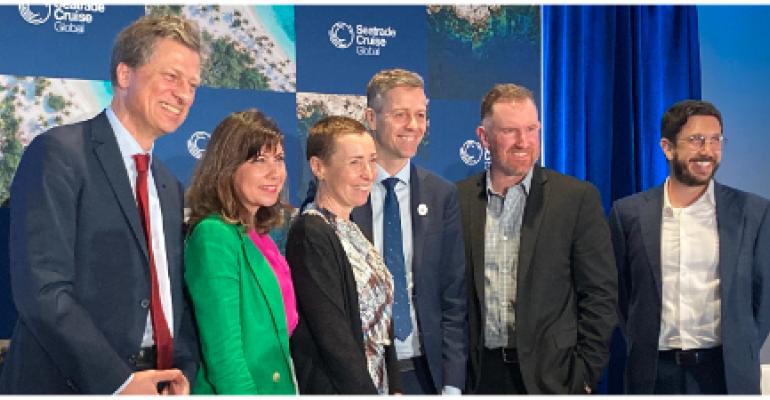The EU's legal landscape is dictating how cruise lines meet their goal of net-zero emissions by 2050, but just how that is achieved was debatable during the "Sustainability and Regulation" panel Tuesday at Seatrade Cruise Global.
European Green Deal
Panelists included Heino Nau, coordinator of the International Blue Economy for the European Commission, the executive branch of the EU. Nau laid out the basics of the European Green Deal, the overarching environmental framework that looks to decarbonize industry, and the facets that apply to cruise ships and the ports they visit.
"We said we want to become climate neutral by 2050. This is the new pathway to climate neutrality," he said. "We need to cut greenhouse gas emissions by at least 55% by 2030 in order to limit global warming to 1.5 degrees Celsius."
As part of that, main targets to reduce the maritime sector's carbon footprint include the use of next-generation fuels while also bringing shore power online at EU ports.
Joining Nau on the panel highlighting the need for regulation was Knut Aril Hareide, the general director of shipping and navigation for the Norwegian Maritime Authority.
"Job. No. 1 for the cruise industry is decarbonization," he said. "Job No. 2 is decarbonization. Job No. 3 is decarbonization."
While the end result has been laid out in no uncertain terms, the path to that goal has the cruise lines seeking guidance, or at least some understanding.
Disparities
Linden Coppell, MSC Cruises' VP sustainability and ESG, pointed out the disparity, for instance, between the call for low-emission fuels for cruise ships versus airplanes, noting the onus of supplying the fuel falls on different shoulders.
"What I'd like to see is an appreciation by the regulators as to the difficulties that we're going to have or the challenges that we're going to face in terms of getting those tools," she said.
Fellow cruise executive, Nick Rose, Royal Caribbean Group's VP for ESG, said consistent definitions of what is green and what is not would help.
"Commonality would be good to start," he said. Different governments, regions and levels of governments look at things differently, creating challenges for industry.
Also on the panel was Figen Ayan, chief port officer for Istanbul's Galataport. She, too, raised red flags about how ports are expected to help satisfy EU requirements when they're so diverse.
Not one size fits all
"Can you feel the pressure on the destinations and the ports?" she asked. "From the cruise line customers, from the regulatory bodies? ... These ports are in different sizes, in different shapes. Some are just islands. Some have millions of passengers."
Rose doubled down on the need for a wider approach so that everybody is on board, comparing it to how the cruise industry tackled the COVID pandemic.
"If there's one thing we learned it's that global problems such as carbon will be solved globally, and making sure that we're reaching out, we're connecting partners, connecting regulators, connecting ports, connecting communities," he said. "... We need to work together. No one can solve this alone and no one industry can solve it alone."
Copyright © 2024. All rights reserved. Seatrade, a trading name of Informa Markets (UK) Limited.
Add Seatrade Cruise News to your Google News feed.  |

